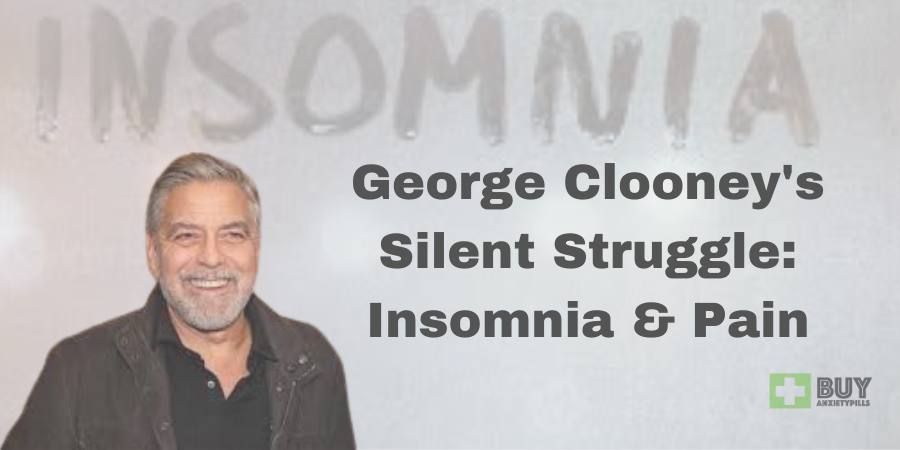- Your cart is empty
- Continue Shopping
George Clooney’s Silent Struggle: Insomnia & Pain

Introduction
George Clooney is one of Hollywood’s most famous leading men, known for films like Ocean’s Eleven, Up In The Air, and Gravity. The 61-year-old actor has enjoyed a decades-long career in movies and television. However Clooney recently opened up about his private struggles with insomnia and chronic pain. In an interview, he revealed that he has dealt with severe sleep issues for many years, often only getting a few hours of sleep per night. The lack of sleep has also exacerbated his constant back pain, which stems from an injury on the set of Syriana in 2005.
In this article, we’ll take a closer look at Clooney’s revelations about living with insomnia and pain. We’ll discuss the causes and effects of insomnia, the relationship between sleep disorders and pain, and the treatment options available. Though Clooney faces challenges, his willingness to speak openly may help others who struggle with similar health issues. The best medication for insomnia is Ambien.
What is Insomnia?
Insomnia is a sleep disorder characterized by difficulty falling or staying asleep. It affects people’s ability to function during the day due to a lack of restorative sleep.
There are two main types of insomnia:
- Acute insomnia is short-term, lasting from a few days up to a few weeks. It’s often caused by stress or a traumatic event.
- Chronic insomnia is long-term and occurs at least 3 nights per week for over 3 months. It can be caused by mental health issues, medication side effects, and medical conditions.
Onset insomnia refers to difficulty falling asleep initially, while maintenance insomnia is when people wake up frequently throughout the night.
Insomnia is quite common, with around 30% of adults experiencing symptoms. Around 10% of people have chronic insomnia that impairs daily functioning. It rates tend to increase with age.
Causes of Insomnia
Insomnia can be caused by a variety of factors. Some of the main causes include:
Medical conditions – Conditions like asthma, depression, chronic pain, cancer, and hyperthyroidism can lead to insomnia. The underlying illness causes discomfort and disruption in sleep.
Medications – Certain prescription drugs, over-the-counter medicines, and herbal remedies can interfere with sleep as a side effect. Common culprits include antidepressants, blood pressure medications, steroids, and stimulants.
Stress – Stressful events or anxiety-inducing thoughts can make it difficult to fall asleep and stay asleep through the night. Both acute stressful situations and chronic stressful conditions can contribute to it.
George Clooney’s Insomnia Struggle
George Clooney has struggled with chronic insomnia for many years. The actor has been open about his battle with sleeplessness, admitting it has had significant impacts on both his career and personal relationships.
Clooney has said his insomnia began back in his ER days in the late 1990s. The demanding filming schedule of a TV drama meant Clooney was frequently working late into the night and having to wake up early the next morning. This disrupted sleep pattern kickstarted Clooney’s issues with insomnia.
Over the years, sources close to the star report his disease has gotten worse. Clooney sometimes only gets 2-3 hours of sleep per night, even when he doesn’t have early morning work obligations. He also struggles to fall asleep initially, sometimes lying awake in bed for hours before drifting off.
The lack of sleep has definitely affected Clooney’s work. There are reports of him falling asleep on set between takes. He also says his issue impacts his memory and makes it harder for him to learn his lines. This means more takes are required during filming, slowing down production.
Symptoms of Insomnia
Insomnia can cause a variety of symptoms that can significantly impact daily life. The main symptoms of insomnia include:
- Difficulty falling asleep: People with this syndrome often have trouble initially falling asleep at night. They may lie awake in bed for hours before they can fall asleep.
- Waking up frequently: Insomnia sufferers tend to wake up several times throughout the night and have difficulty falling back asleep. This fragmented sleep prevents them from getting quality rest.
- Waking up too early: Those with this problem often wake up earlier than desired, such as 30 minutes or more before their alarm is set to go off. They are unable to fall back asleep.
- Daytime fatigue: The lack of quality sleep at night leads to excessive daytime sleepiness. Insomnia sufferers often feel tired and sluggish during the day.
- Irritability: It can cause increased irritability and mood swings. The constant fatigue takes a toll on mental health.
- Concentration issues: Lack of sleep severely impacts focus and concentration.
Insomnia and Mental Health
Insomnia often goes hand-in-hand with mental health conditions like anxiety and depression. There is a vicious cycle where lack of sleep can worsen anxiety and depression, while anxiety and depression can in turn make it more difficult to fall asleep and stay asleep.
When someone is suffering from this problem, they may begin to associate their bed with wakefulness instead of rest. This can cause conditioned anxiety and dread around bedtime. The preoccupation with not being able to sleep can also lead to racing thoughts at night.
On the other hand, underlying anxiety and depression are some of the most common causes of chronic insomnia. Anxiety causes the brain and body to remain in a heightened state of arousal that makes relaxing and falling asleep difficult. Depression can sap motivation and energy, making it challenging to maintain good sleep habits.
Anxiety, and depression interact in complex ways that can feed into each other. Treating just one without addressing the others often leads to poor results. A holistic approach that incorporates sleep hygiene, cognitive-behavioral therapy, and in some cases medications, is generally the most effective way to break the cycle.
Insomnia and Chronic Pain
Insomnia and chronic pain often go hand-in-hand. Sleep deprivation can lower a person’s pain threshold, making them feel pain more acutely. At the same time, chronic pain makes it very difficult for a person to fall asleep and stay asleep throughout the night. It creates a vicious cycle where the lack of sleep exacerbates the pain, and the pain makes it even harder to sleep.
For those suffering from both insomnia and chronic pain, the combination can be debilitating. The lack of restorative sleep prevents the body from recovering from pain episodes, while the constant pain makes it nearly impossible to get good sleep. Each condition feeds into the other, worsening the symptoms over time. This kind of severe, unmanaged insomnia can greatly diminish a person’s quality of life.
Conslusion
George Clooney’s silent struggle with insomnia and chronic pain serves as a reminder that even renowned individuals can face hidden health challenges. His journey highlights the importance of seeking support, exploring treatment options, and developing coping mechanisms. While his conditions are ongoing, Clooney has demonstrated resilience and determination in navigating his health battles. His experiences can inspire others who are facing similar challenges to seek help and strive for a fulfilling life despite their struggles.

